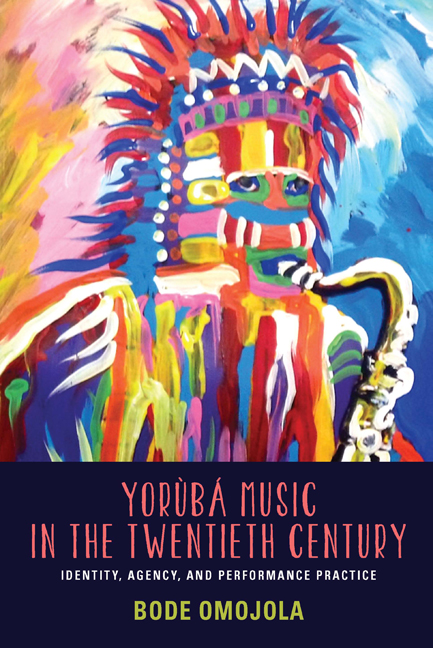Book contents
- Frontmatter
- Dedication
- Contents
- Acknowledgments
- Introduction
- 1 Yorùbá Drumming: Performance Practice and the Politics of Identity
- 2 Talking and Stammering: Toward an Analysis of Yorùbá Drumming
- 3 Songs of the King’s Wives: Gendered and Social Identities in Yorùbá Vocal Performance
- 4 The Aírégbé Song Tradition of Yorùbá Female Chiefs
- 5 Yorùbá Music in the Christian Liturgy: Notation, Performance, and Identity
- 6 Yorùbá Music in Christian Worship: The Aládǔrà Church
- 7 Yorùbá Popular Music: Hybridity, Identity, and Power
- 8 Yorùbá Islamic Popular Music
- Conclusion
- Appendixes
- Notes
- Selected Discography and Videography
- Bibliography
- Index
Introduction
Published online by Cambridge University Press: 11 January 2024
- Frontmatter
- Dedication
- Contents
- Acknowledgments
- Introduction
- 1 Yorùbá Drumming: Performance Practice and the Politics of Identity
- 2 Talking and Stammering: Toward an Analysis of Yorùbá Drumming
- 3 Songs of the King’s Wives: Gendered and Social Identities in Yorùbá Vocal Performance
- 4 The Aírégbé Song Tradition of Yorùbá Female Chiefs
- 5 Yorùbá Music in the Christian Liturgy: Notation, Performance, and Identity
- 6 Yorùbá Music in Christian Worship: The Aládǔrà Church
- 7 Yorùbá Popular Music: Hybridity, Identity, and Power
- 8 Yorùbá Islamic Popular Music
- Conclusion
- Appendixes
- Notes
- Selected Discography and Videography
- Bibliography
- Index
Summary
The issue of identity, a central theme in this book, is a familiar topic in ethnomusicological literature, one that continues to generate considerable interest among scholars who seek to understand how music defines individual traits and group affiliation; how music articulates the relationship between self-identity and social identity; and, on a cognitive level, how musical concept, behavior, and sound translate into, enhance, or reveal a capacity for self-reflection.1 With specific reference to Yorùbá culture, one immediate concern is how to deal with the notion of an assumed homogeneous identity, a hegemonic “framework for cultural identity” that laminates the plethora of local and individual identities that lie beneath.
What do we mean, for example, when we speak of a Yorùbá identity? Are we referring to a unified, homogeneous identity, or are we musing about the many types and levels of group affiliations, framed by such cultural identifiers as gender, religion, ethnicity, place, and professional guilds, to mention but just a few? In engaging the ramifications of these questions, Christopher Waterman, who has done extensive work on this topic, reminds us about the constant engagement between the “internal face of identity” and the “socially constructed identity.” The dynamic between the notion of the “self” and that of the “person” draws attention to the ways in which identity is constructed on different levels and shaped by social contingencies and competing interests. Given the nature of Yorùbá history and society and the ways in which various Yorùbá musical traditions are organized, my discussion throughout this book analyzes the ways in which the process of identity construction is guided by the principle of “nested cultural formations”—it is framed simultaneously by a desire to unify and differentiate. It is informed by a strategic process that ultimately entails what Thomas Turino describes as “the partial and the variable selection of habits and attributes that we use to represent ourselves to ourselves and to others as well as those aspects that are perceived by ourselves and by others as salient.” This twotiered approach to identity construction is ethnographically mirrored in the ways in which the average Yorùbá person describes himself or herself. In situations involving non-Yorùbá persons from within or outside Nigeria, the label Yorùbá is often used by the people to categorize themselves.
- Type
- Chapter
- Information
- Yorùbá Music in the Twentieth CenturyIdentity, Agency, and Performance Practice, pp. 1 - 15Publisher: Boydell & BrewerPrint publication year: 2014



